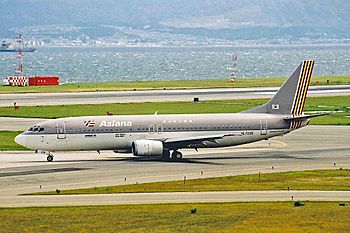Asiana Airlines Flight 733 facts for kids

A 737-400 similar to the aircraft that crashed
|
|
| Accident summary | |
|---|---|
| Date | July 26, 1993 |
| Summary | Controlled flight into terrain due to pilot error and bad weather |
| Place | Ungeo Mountain near Mokpo Airport, South Korea 34°42′30.66″N 126°18′38.66″E / 34.7085167°N 126.3107389°E |
| Passengers | 110 |
| Crew | 6 |
| Fatalities | 68 |
| Survivors | 48 |
| Aircraft type | Boeing 737-5L9 |
| Airline/user | Asiana Airlines |
| Registration | HL7229 |
| Flew from | Seoul-Gimpo International Airport (SEL) |
| Flying to | Mokpo Airport (MPK) |
Asiana Airlines Flight 733 (OZ733, AAR733, registration HL7229) was a domestic Asiana Airlines passenger flight. The flight was from Seoul-Gimpo International Airport to Mokpo Airport, South Korea.
On July 26, 1993, this flight crashed in the Hwawon area of Haenam County, South Jeolla Province. This area is near Ungeo Mountain and Mokpo Airport. Out of 116 people on board, 68 did not survive the accident. This included both the captain and the first officer.
What Happened to Flight 733?
Asiana Airlines Flight 733 was flying from Seoul to Mokpo. The plane was a Boeing 737-5L9. It had 110 passengers and 6 crew members on board.
The flight was supposed to land at Mokpo Airport. However, the weather conditions were very bad. There was heavy rain and strong winds. This made it difficult for the pilots to see and land the aircraft safely.
The Approach to Mokpo
The pilots tried to land the plane at Mokpo Airport several times.
- The first two attempts to land were not successful because of the bad weather.
- During the third attempt, the plane was flying too low.
- It then crashed into Ungeo Mountain.
This type of accident is called a "controlled flight into terrain." This means that the pilots were in control of the aircraft, but they did not realize they were flying too close to the ground or a mountain.
Why the Crash Occurred
Investigations into the crash found two main reasons for the accident:
- Pilot error: The pilots made mistakes in how they flew the plane. They did not follow the correct procedures for landing in bad weather. They also did not realize how low the plane was flying.
- Bad weather: The severe rain and wind made it very hard for the pilots to see. It also made it difficult to control the plane.
The combination of these factors led to the tragic crash of Flight 733. Aviation safety rules and technologies have improved a lot since this accident. These improvements help prevent similar events from happening again.
See also
 In Spanish: Vuelo 733 de Asiana Airlines para niños
In Spanish: Vuelo 733 de Asiana Airlines para niños
 | Percy Lavon Julian |
 | Katherine Johnson |
 | George Washington Carver |
 | Annie Easley |

